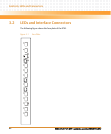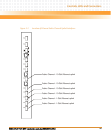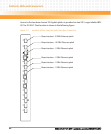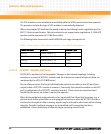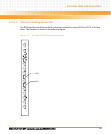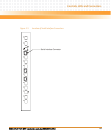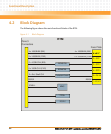
Controls, LEDs and Connectors
RTM-ATCA-F120-OPT Installation and Use (6806800G29C)
50
The SFP modules can be installed/removed both while the RTM is powered and non-powered.
The presence and also the type of SFP modules is automatically detected.
When using copper SFP modules, the speed is determined through auto-negotiation per the
802.11 Ethernet specification. Optical modules do not support auto-negotiation. A 1GBit SFP
module must be connected to 1 GBit fibre cables.
The following table shows which switch MIB OID each cage corresponds to.
3.2.2.3 SFP/SFP+ Module Hot Swap
All SFP/SFP+ modules are hot-swappable. Changes in the network topology, including
insertion or removal of SFP/SFP+ modules and the insertion or removal of optical cables, are
monitored by the ATCA-F120 BBS kernel.
Due to safety concerns, the kernel will disable the optical transmitter on the SFP port (laser
output) when a SFP/SFP+ module is removed. Conversely, the optical transmitter on the SFP
port is enabled when the SFP/SFP+ module is inserted. These events are monitored and
handled by the kernel; no action is required by operator.
When the kernel detects a discontinuity in the signal path that allows light to escape, e.g. a
physical break in the optical fiber or an unplugged connector or when an SFP/SFP+ has been
inserted, but the optical cable is missing, signals may be reduced to safer levels without losing
integrity. Periodic heartbeat messages are transmitted until a connection has been
established. Once established, all channels begin operating normal levels.
Table 3-5 Base Channel 1 GBit Uplink Connectors - Port - MIB OID Assignment
Face Plate Label MIB OID Ethernet Type
BIX GE1 <shelf>.<slot>.1.17 1 GBit
BIX GE2 <shelf>.<slot>.1.18 1 GBit
BIX GE3 <shelf>.<slot>.1.19 1 GBit
BIX GE4 <shelf>.<slot>.1.20 1 GBit



